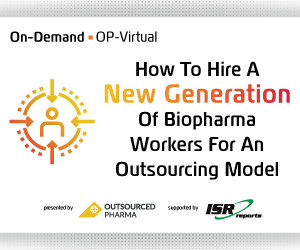Today's Biotech Start-Up: Experienced Leaders, Wise Investors

By Louis Garguilo, Chief Editor, Outsourced Pharma

Sesha Neervannan had been in the drug development and commercialization industry for 25 years of big: Bristol Myers Squibb; Amgen; Allergan.
Then he joined a start-up a few months ago.
He has a lot to say about the biopharma space today, and offers some best practices for Outsourced Pharma readers creating development and manufacturing outsourcing strategies.
Neervannan is Chief Operating Officer at Tarsus Pharmaceuticals, Inc., an Irvine, California-based, late clinical-stage biopharmaceutical company.
Tarsus is focused on the development and commercialization of therapeutic candidates to address “large market opportunities,” initially in ophthalmic conditions with limited treatment alternatives. Its lead candidate, TP-03, is a novel therapeutic for Demodex blepharitis, and commenced a phase 2b/3 clinical study this year.
“Biopharma start-ups have changed,” Neervannan tells me, still freshly enthusiastic about his career move. “It used to be more academic people.”
“Today – along with their investors – start-ups have grown up. They come in with a different mindset.”
Neervannan has had a direct view of this evolution, particularly through biotech acquisitions he oversaw while at Allergan.
“It used to be the startup world was very uncertain,” he says.
“People were worried about job security, but now those concerns have leveled off. It's a myth large companies offer better job security – and better compensation – than at start-ups.”
Matured Leadership
That added stability at start-ups coincides with the arrival of seasoned biopharma executives, with Neervannan as a prime example.

“Start-ups right from the outset want products advanced into clinical trials and approvals. To do that, you need those who know how to navigate that pathway.
“So they want industry veterans, but individuals who are also flexible enough to handle the start-up world.”
Those requirements prompted Neervannan to make his latest career move.
“I said, ‘Here I am some 25 years in the industry, gone through many approval processes; I know a thing or two.’ When I started talking with Tarsus, it was natural. There were welcoming arms.”
The Smarter Money
I ask Neervannan if biopharma investors are in fact becoming more sophisticated.
“They really are,” he replies. “I prescribe to a model that starts with internal capabilities – early-stage labs where you can work on formulation and some aspects of product development,” he explains, and “laying out those plans for success to investors.”
And that means Neervannan does not prescribe to the all-outsourced model.
“It takes too much time having all activities externally located,” he explains. “You don't have the flexibility.”
“Hiring just a few experts in your area, and having small labs for early work, is not cost prohibitive. What you are doing is generating – and holding onto – internal knowledge of your product. It helps with the intellectual property creation.”
A switch to a more outsourced model, he says, comes with the need for larger scale-ups and clinical supplies.
“Laying this strategy out for investors is important. They want to know where the money is going, right?”
Investors, says Neervannan, typically have two points of focus.
First, they want the money at a young company to be maximized for value creation.
“What creates value is clinical data and IP. Investors are asking, how are you going to spend the money for that purpose? What capital investments are required?”
The second concern looks further down the road, and specifically introduces the subject of outsourcing to the conversation. Questions like these arise:
- Will these external suppliers be reliable?
- Will the generated IP be safe?
- When we get to commercial, will there be supply interruptions?
“This is where the investors’ savvy has increased significantly,” says Neervannan. “They ask the right questions. Biotechs must have their strategies in line.”
“In fact,” he continues, “this is the first thing I started doing when I joined Tarsus – already looking at our manufacturing strategy as related to our capital investment strategy. It’s vital to the success of the entire organization.”
Big Not Necessarily Better
Neervannan – an Outsourced Pharma Advisory Board member – has some advice for start-up biopharma putting their outsourcing strategies in place.
He starts with those companies pursuing mostly “standard technologies,” such as tablet or capsule deliveries.
“It’s not necessary to go to the big, well-known CDMOs,” he says.
“I think smaller service providers can develop formulations and supplies more quickly. These are small-scale projects for early phases; you don't need large amounts of supply.
“It’s absolutely okay to go to CDMOs that don't have commercial supply chain capabilities.
“In fact, it may be advantageous to start there, because they are focused on clinical stage, and ensuring they have the right tools, technologies, and business model for clinical stage.”
As a matter of strategy, the bigger CDMOs are ultimately interested in gaining commercial contracts. “It’s in their character. Their clinical stage offering can feel like a carrot for that reward,” says Neervannan.
He believes typically the large CDMOs in the early stages do not create the value he outlined above.
“Still today, I believe smaller relationships provide more one-on-one attention,” he says.
“On the other hand,” he continues, “if you are a start-up in need of skilled technology specialists – often in new areas of research and development – or in programs requiring sterile manufacturing, there are not a lot of CDMOs to select from.”
And with sterile manufacturing as an example, he says the size of the CDMO matters less.
“Whether you're in early or late stages, a sterile product is a sterile product: you have to be compliant, and you can't compromise on safety. Small CDMOs may not have that level of investment.
He adds: “You have to pick partners carefully, based on your technology and regulatory requirements. You certainly don't want a CDMO that's inexperienced. It's important to get the right balance.”
And who understands that balance best?
Professionals like Neervannan, who bring outsourcing experience and can work with savvy investors.

